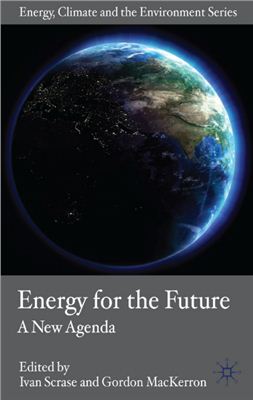Palgrave Macmillan, New York, 2009, 298 p.
Cutting carbon emissions is urgent but very challenging in wealthy democracies. Energy for the Future analyzes the changing contexts, imperatives and fault lines, and proposes ways forwards. Greater public engagement and a new approach to markets are vital, but traditional conces with energy security and economic efficiency cannot be set aside.
Preventing dangerous climate change must be the priority for energy policy. The context is difficult, however, with rapid growth in energy demand around the world and growing fears about the security of supplies (see Chapter 1). Moreover, the urgency with which climate change must be tackled threatens to strain the principles of democratic govement.
This book focuses on explaining these issues and suggesting ways forward as govements come up against these trade-offs and tensions. Industrialised nations have a historic responsibility for causing climate change, and therefore a moral obligation to reduce their own greenhouse
gas emissions. However, in almost all countries, despite some good intentions and positive rhetoric, emissions are still rising. Energy for the Future goes a long way to explain why wealthy nations are finding it such a challenge to make their energy systems sustainable (Part I), and proposes steps govements and politically engaged stakeholders and citizens can take in leading the necessary transitions to low carbon economies (Parts II and III).
With a book of this breadth each reader will draw different lessons, and add these to their prior knowledge and understanding.
Cutting carbon emissions is urgent but very challenging in wealthy democracies. Energy for the Future analyzes the changing contexts, imperatives and fault lines, and proposes ways forwards. Greater public engagement and a new approach to markets are vital, but traditional conces with energy security and economic efficiency cannot be set aside.
Preventing dangerous climate change must be the priority for energy policy. The context is difficult, however, with rapid growth in energy demand around the world and growing fears about the security of supplies (see Chapter 1). Moreover, the urgency with which climate change must be tackled threatens to strain the principles of democratic govement.
This book focuses on explaining these issues and suggesting ways forward as govements come up against these trade-offs and tensions. Industrialised nations have a historic responsibility for causing climate change, and therefore a moral obligation to reduce their own greenhouse
gas emissions. However, in almost all countries, despite some good intentions and positive rhetoric, emissions are still rising. Energy for the Future goes a long way to explain why wealthy nations are finding it such a challenge to make their energy systems sustainable (Part I), and proposes steps govements and politically engaged stakeholders and citizens can take in leading the necessary transitions to low carbon economies (Parts II and III).
With a book of this breadth each reader will draw different lessons, and add these to their prior knowledge and understanding.

